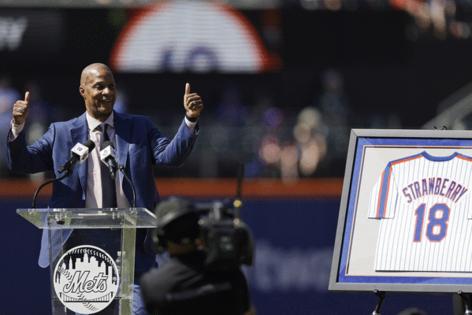Mets Legend Darryl Strawberry on people trying to erase Jackie Robinson's legacy: 'Shame on them'
Published in Baseball
NEW YORK — Darryl Strawberry has some words for the people trying to erase Jackie Robinson‘s legacy. To put it simply, they should be ashamed.
“Shame on them,” the former Mets outfielder said Thursday at Citi Field.
Robinson’s heroic legacy of breaking MLB’s color barrier has been lauded for decades, with the league annually celebrating the day he played his first major league game. Jackie Robinson Day came and went Tuesday, with the same fanfare it always comes with. Every player wore No. 42 and tribute videos were played on stadium scoreboards.
But it comes at an inflection point for the country. Suddenly, race isn’t a consideration in the celebration of a player who was, for years, excluded from Major League Baseball because of his race.
MLB’s press release about the day didn’t contain the word Black. Last month, the Defense Department took down Robinson’s bio before reinstating it, with the government telling ESPN it was part of the Trump administration’s push to remove references to DEI.
Actions like this have been seen by many as attempts to rewrite the narrative around one of baseball’s cultural heroes, if not outright eliminate it.
“Shame on them if they do that,” Strawberry said. “Shame on them because [he was] a person that had to fight so hard. Not only was he fighting for himself, he was fighting for any player of color that put on the uniform. From black players to Latin players, and no one of color puts on a uniform had it not been for him, and a door open for him to do that. It would be a shame if they can’t keep that right, keep it the way it should be because it represents something; something more than you could probably ever imagine. The average person probably couldn’t have done what he had done at that particular time ...
“I know I couldn’t.”
Strawberry was at Citi Field for the Mets’ Black Legacy Game, a game that honors the history of players like Robinson and the ones he blazed a trail for when he became the first Black player to play in a major league game.
Born in Los Angeles, the same area Robinson called home, Strawberry was influenced by Robinson, but wasn’t necessarily aware of all that he had to endure. Strawberry grew up in South Central, an inner-city neighborhood where he played baseball with and against other Black kids.
In the minor leagues, that all changed. He was in small towns in the South — towns that weren’t so friendly to Black people in the 1980s. He gravitated toward pitching coach Al Jackson, who had been around baseball shortly after integration. Jackson helped Strawberry realize the burden that was placed on Robinson and so many other players.
Then Strawberry went to Lynchburg, Va., and was faced with racial taunts, discrimination and hateful rhetoric. It had the Mets’ all-time home run leader considering leaving baseball behind at 19 years old.
“My manager, Gene Dusan, used to tell me, ‘Just don’t look up there,' ” Strawberry said. “I was struggling that year, and I came close to quitting baseball, but he helped me get through that season. I think he figured, if I looked up there — up in the crowd where they were calling me a ‘boy’ and the N word, I probably would have took my Louisville Slugger and went up there and eliminated somebody. But Gene Dusan kept me together. I am grateful for that.”
Dusan, who was white, became a father figure to Strawberry. Chuck Hiller, his first coach in Kingsport, was as well. Lloyd McClendon was an older brother of sorts, another Black outfielder who was a few years older and able to help inform him of what he was going up against.
The inner city baseball fields Strawberry played on haven’t quite disappeared, but they are dwindling. The NBA is the more popular league among Black youth and the NFL is the most popular league among all young American sports fans. Which is why it’s important for Strawberry to continue to show up for games like the Black Legacy Game and why it’s important that the legacy of Robinson is kept alive.
But the celebrations of April 15 are largely saccharine. Commemorative days are often performative in nature, and with race dividing the country more than it has since the Civil Rights era, teams are trying to figure out how to sidestep any controversy.
But Robinson shouldn’t be a controversial figure. You can’t discuss his legacy without discussing race and the ugliness he faced because of his race. It’s part of his story, it’s part of Hank Aaron’s story and it’s part of Strawberry’s story as well.
“Jackie wasn’t just a player, Jackie was a man of true character,” Strawberry said. “When you read about him and you learn about him, you learn that his character was probably just as great as his game as a player. That says a lot when you have to endure so much and have to take so much criticism and hatred towards you, but still keep the same character ...
“It’s a great legacy for what he stood for and how he stood up for it.”
©2025 New York Daily News. Visit nydailynews.com. Distributed by Tribune Content Agency, LLC.







Comments